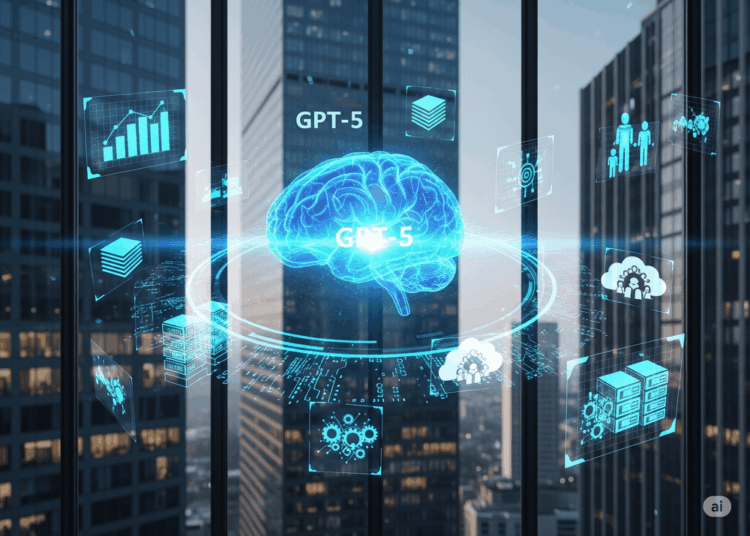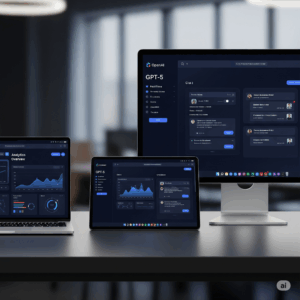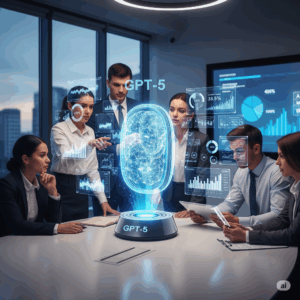OpenAI Unveils GPT-5: Advancing AI for Enterprise Power
OpenAI has officially launched GPT-5, the highly anticipated upgrade to its generative AI technology that powers ChatGPT. The model, now available to all 700 million ChatGPT users, is designed with advanced enterprise capabilities, promising stronger performance in software development, finance, science, and health-related queries.
The debut comes at a critical moment for the AI sector, as major tech companies — including Alphabet, Meta, Amazon, and Microsoft (OpenAI’s primary backer) — invest heavily in AI infrastructure. Together, these giants are projected to spend nearly $400 billion this fiscal year on AI data centers, intensifying the race to see real returns on such investments.
GPT-5 Targets Enterprise Excellence
According to OpenAI CEO Sam Altman, GPT-5 is the company’s first mainline model that feels like “a legitimate PhD-level expert” across a wide range of subjects. Beyond its enhanced writing and reasoning skills, one standout capability is “software on demand” — the ability to instantly generate functional software from natural language prompts, a process demonstrated in live demos as “vibe coding.”
This enterprise focus reflects OpenAI’s strategy to tap into a market segment with far greater revenue potential than casual consumer use. While public interest in ChatGPT remains high, experts like Noah Smith note that consumer spending alone is unlikely to justify the massive AI infrastructure costs.
Incremental but Significant Improvements
While early testers praised GPT-5 for its coding prowess and ability to solve complex math and science problems, some noted that the leap from GPT-4 to GPT-5 is smaller compared to previous jumps in OpenAI’s technology. Nonetheless, the improvements are critical for enterprise deployment, particularly in areas demanding precision and reliability.
Altman emphasized that GPT-5 is still not self-learning and cannot fully replace human expertise. However, it introduces new “test-time compute” technology — allowing the model to spend more processing time on particularly challenging problems, resulting in more accurate and reasoned answers.
Overcoming the Scaling Challenge
Since the launch of ChatGPT nearly three years ago, OpenAI has pursued a “scaling up” strategy — boosting computing power and data input to improve model performance. While GPT-4’s advancements were fueled by massive data and computational resources, OpenAI has since encountered obstacles.
One major challenge is the “data wall” — the limited availability of large, high-quality, human-generated datasets on the internet. Additionally, training large-scale AI models comes with increased hardware failure risks, with researchers often waiting months to see the final performance of a model.
Test-time compute offers a partial workaround, allowing GPT-5 to dynamically allocate more computational resources to difficult tasks without retraining the entire model. This is the first time the general public will have access to such technology, which OpenAI views as an important step in building AI that serves humanity globally.
Investment, Valuation, and Industry Momentum
OpenAI is reportedly in early talks to allow employees to sell shares at a $500 billion valuation — a dramatic rise from its current $300 billion valuation. Top AI researchers are commanding signing bonuses up to $100 million, highlighting the competitive nature of the field.
Despite staggering infrastructure investments from industry leaders, Altman believes even more global AI infrastructure is needed to bring advanced capabilities like GPT-5 to all markets.
The Road Ahead
The release of GPT-5 reinforces OpenAI’s ambition to remain at the forefront of the generative AI race. While the step forward may not be as dramatic as previous leaps, its focus on enterprise-grade reliability, advanced coding, and reasoning capabilities could be pivotal in securing long-term adoption across industries.
As Altman put it, GPT-5 is not just a better chatbot — it’s a tool designed to power the next generation of enterprise applications, from real-time financial analysis to on-demand software development.
CTA: Explore deeper insights on GPT-5 and the future of enterprise AI with IMPAAKT — your trusted source in a top business magazine.













